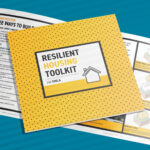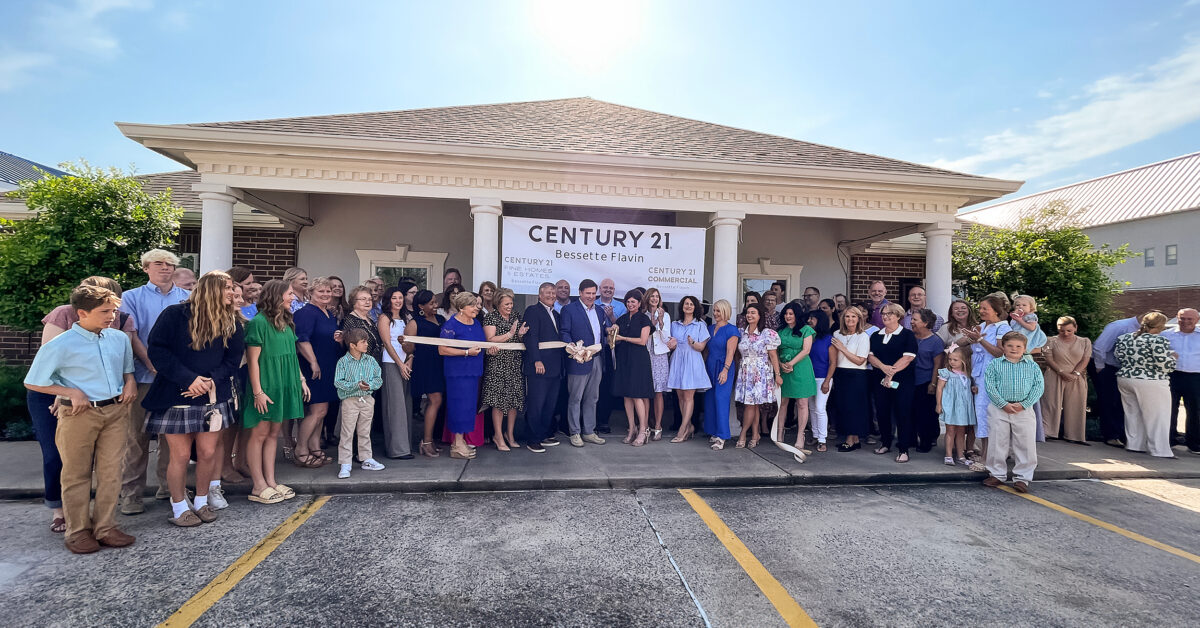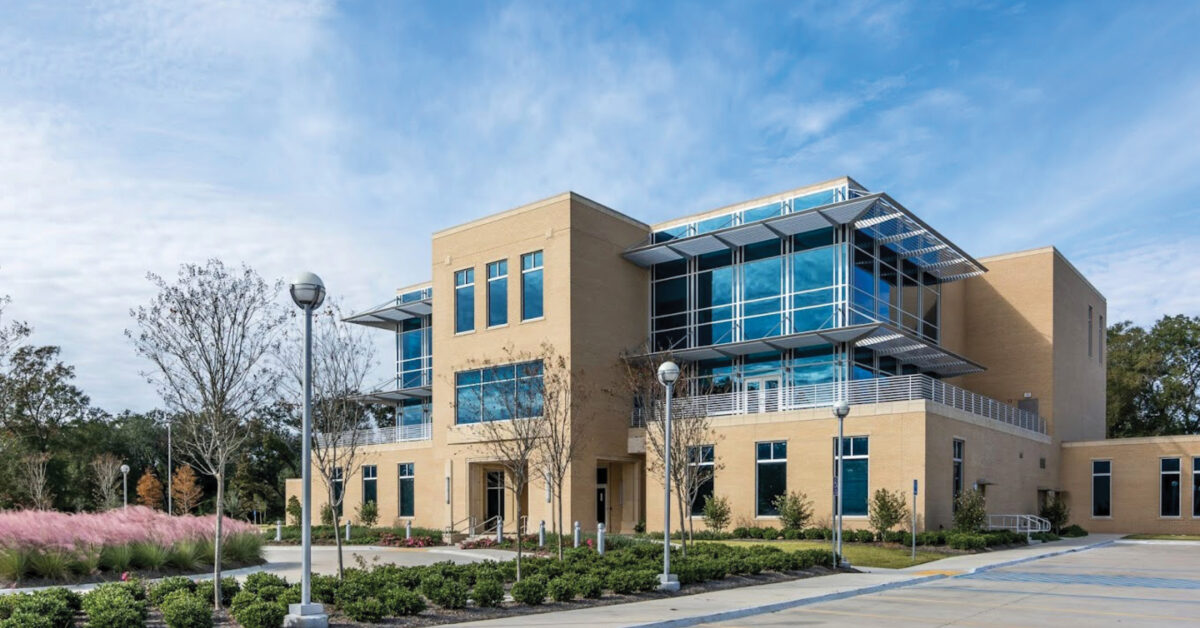
Just Imagine SWLA: Resilient Housing Toolkit
July 2023
Newcomer’s Guide to the Lake Area
July 2023Applications, scholarships, and essays – oh my! The journey that officially begins after high school graduation actually starts well before that celebratory day. As with most things, preparation is key and timing is everything. Fortunately, for students in Southwest Louisiana, resources and incredible education opportunities are close to home. In this special section, Thrive brings you expert advice and updates from local institutions to ensure the path to postsecondary education is off to a great start this school year.
Louisiana Colleges: Updates from Southwest Louisiana Campuses
McNeese State University
First Day of Class for fall semester is Monday, Aug. 14, 2023.
“We can’t wait for the fall semester to welcome the new freshmen and returning students to campus. It’s going to be a great year!” – Daryl Burckel, president of McNeese State University
- New Concentrations
The McNeese State University College of Business is offering several new concentrations, or options, for students. Accounting students can focus on managerial accounting and finance students can concentrate on financial services. Business administration students can focus on business analytics and international business. Mass communication students can choose sport and entertainment communication, and political science majors can concentrate on environmental policy. The College of Business now offers a certificate in Liquified Natural Gas (LNG) business in which students take six additional LNG business specific courses to earn the certificate.
- Agreements for Students to Continue After Earning an Associate Degree
McNeese recently signed new articulation agreements with South Louisiana Community College and Lamar State College Orange. Students who graduate with an associate degree in business can apply all their credits towards a bachelor’s degree in the College of Business at McNeese. Another recent agreement between SOWELA Technical and Community College and McNeese College of Nursing and Health Professions clears the way for students who have earned an associate degree in nursing and have their registered nursing (RN) license to transfer their credits to McNeese to earn a Bachelor of Nursing degree.
- Student Health and Counseling Services
Student Health Services and Student Counseling Services have moved to 4100 Ryan Street along with Oschner CHRISTUS Urgent Care. Students will see the McNeese Student Health staff during regular business hours and Oschner CHRISTUS staff for after-hours care. Students will continue to receive free acute medical care and health and wellness visits as costs covered in the student fees. Counseling services are also available in the same location.
- McNeese Full of Excitement in the Fall
Campus is an excellent place to be in the fall! Tailgating before a football game, listening to the Pride of McNeese Band during the games, and cheering on the volleyball and soccer teams are just some of the exciting activities happening at McNeese. Students can get involved in Greek life, student government and other social and major-specific organizations. Everyone looks forward to Homecoming Week! Students can get muddy during the annual ooze-ball tournament, ride a float in the parade and watch fireworks after the pep rally. It’s a wonderful time to be a McNeese Cowboy!
SOWELA Technical Community College
- Nursing (RN) Program Expansion
According to estimates by the Louisiana Board of Regents, there will be a shortfall of approximately 6,000 registered nurses, which is 40% of the current workforce by 2030. To help address this shortfall, SOWELA is expanding its Nursing program during the next academic year to include two start dates, one in the fall and one is the spring.
“The College recently graduated 44 Associate of Science in Nursing (ASN-RN) students during the June commencement ceremony. Soon, this number may significantly increase with the addition of a spring cohort,” said Dr. Paula Hellums, SOWELA Vice Chancellor for Academic Affairs. “Since the program’s inception in 2016, students have been accepted into clinical coursework each fall. Beginning in spring 2024, qualified students will have the option to enter clinical courses each spring semester as well. Increasing capacity will allow more students to be served, graduate, sit for their licensure exam, and ultimately enter the healthcare workforce in our region.”
- 85th Anniversary/Enrollment
SOWELA marks 85 years of educational excellence this year and recently graduated 333 students, surpassing pre-COVID-19 and hurricane graduation numbers. “Over the last 85 years, SOWELA has grown from a vocational/technical/trade school to a comprehensive community college. We pride ourselves on our ability to produce a skilled and qualified workforce for SWLA, the State of Louisiana, and the nation. We have truly become a major part of the economic engine for the SWLA region,” said SOWELA Chancellor Dr. Neil Aspinwall. “Our great successes over the years (ranked the #1 community college in LA for 6 years and recognized as a “Great College to Work For”) have been made possible because of the dedication, support, and focus of our faculty and staff and their understanding that the students are our most important asset and the sole reason the institution exists.
- New Financial Aid Opportunity
Eligible new and current students at SOWELA Technical Community College can take advantage of Louisiana’s “M.J. Foster Promise Program,” a financial aid award given on a first-come, first-served basis. Funds from the program are available to students over three years to cover their tuition and fees. Qualifying students are eligible for a maximum of $3,200 per award year, which covers most tuition and fees, with a maximum lifetime benefit of $6,400. Students must be 21 years or older to qualify.
- New Short-term Training
Due to the construction of a new $50 million fiber optic network in Lake Charles, Sulphur and Westlake, SOWELA is now offering Fiber Optic Technician training. Tuition is currently half-off for all fiber optics courses, ranging in cost from $450-$500. Fiber Optics Technicians are considered four-star jobs based on job market demand, salary and educational requirements, according to the Louisiana Workforce Commission. The average salary is $33/hour or more with experience. Training leads to certifications for Fiber Optic Technician, Testing and Maintenance and Splicing. Primary responsibilities include installing and repairing fiber optic cables, a technology that uses threads and glass as a means of transmitting data.
South Louisiana Community College
- New 2+2 Agreement with McNeese State University
South Louisiana Community College (SLCC) and McNeese State University have signed a new 2+2 agreement that will allow students to seamlessly transfer from SLCC’s associate degree program in business to McNeese’s bachelor’s degree program in business. The new agreement was signed May 17, 2023, on SLCC’s Lafayette Campus. It will allow students to complete their first two years of coursework at SLCC, then transfer to McNeese to complete the final two years of their bachelor’s degree. This new initiative will allow more students to further their education, enriching both communities. “Students deserve a straight path to transfer from the community college to their chosen university,” said Dr. Crystal Lee, VC for Academic and Student Affairs. “This transfer agreement between South Louisiana Community College and McNeese State University, provides students majoring in Business, exactly that, a clear path to success.”
- 2023 LAIR Conference
The Louisiana Association for Institutional Research’s (LAIR) 2023 conference will be held at the SLCC Lafayette Campus July 25 and 26. This year the conference aims to bring the institutional research community together for collaboration, and professional development. LAIR is a non-profit organization that promotes institutional research in higher education. Its mission is to foster communication and cooperation among institutional researchers, to promote the continued professional development of its members, and to advance the field of institutional research in Louisiana.”We are thrilled to welcome the Louisiana Association of Institutional Research to our campus for their 2023 conference. South Louisiana Community College is dedicated to promoting educational excellence and providing opportunities for professional growth, and hosting this prestigious event is a testament to our commitment to these values,” said Dr. Vincent June, SLCC Chancellor. “We look forward to engaging with colleagues from across the state to share best practices and advance our collective knowledge in the field of institutional research.”
- TANF Navigator Position Launches
Robin Winston, Interim Financial Aid Director at South Louisiana Community College, says SLCC is breaking the mold with a transformative addition to the staff, a new TANF Navigator. Tanya Martinez joined SLCC in January 2023 and has been busy changing lives since. “This position of a Temporary Assistance for Needy Families (TANF) Navigator is new; it’s never been done at a college in Louisiana before. This is about changing the lives, changing the mindset of people who may not have considered furthering their education.” The TANF program is designed to help low-income families with children achieve economic self-sufficiency. States use TANF to fund monthly cash assistance payments to those families, as well as a wide range of services. Now part of those services includes navigating a better education through SLCC. “There is a real need,” explains Martinez. “I’ve been here since the start of the year, and in that time, I’ve received around 40 referrals. I’ve been able to help people understand what SLCC offers and how it’s achievable in their lives.”
Top Tips to Get to the Tip Top
The run down on applying for and getting into college
By Taylor Trahan Henry
Gone are the days of colleges simply checking the boxes on their applicants – good GPA, high test scores, coursework completed. Now, admissions departments at colleges across Louisiana and the country are looking at students as a whole before deciding. Sure, they want to know you’re a good student who is dedicated to their studies, but they are also looking for who you are outside of the classroom as a factor.
“The academic resume is imperative now,” says Tracey Churchman, owner and consultant with Churchman College Consulting. “It includes things like your GPA, rank, and ACT or SAT score, but it also includes honors, awards, involvement inside of school in clubs or sports and outside of school in religious, civic, or volunteer organizations.”
This approach looks at students as a whole and allows them to show off the best parts of themselves. Community service and volunteerism are a vital piece of the application process. “I like to tell my students, it’s quality over quantity,” says Churchman. “Don’t focus on building a laundry list of brief experiences, look to get involved in something consistently. Show colleges what’s important to you, where you’re willing to invest your time.”
Juniors and seniors and their parents should begin work now to prepare for 2024 and 2025 post-graduation plans. That day in May might seem far away, but it will creep up quickly. Being prepared and asking a few key questions can help everyone involved feel confident come the spring.
- Make your Wish List
“One of the first things I do with students is make their wish list of schools or programs,” Churchman says. “We want to make sure we’re on track for each of those top choices.” Knowing admission requirements like standardized test scores, high school curriculum, and if an essay is required can aid in goal setting, class scheduling, and time management of those senior year tasks. It’s important to note that application deadlines differ from school to school, but November 1 is a good rule of thumb for completion of forms and essays needed.
- Things to Consider
Of course, in making your wish list, it’s important to remain realistic. “There are a few questions you should be asking yourself (or your student),” says Churchman. “Do they have the major or pathway you’re considering? What are the statistics on graduates in the profession you’re considering? Are there housing rules and where will you live if you attend? And probably the most important question, is the cost feasible for me?”
- Safety and Student Life
When trying to decide if a campus is right for you, the best thing to do is to take a tour. Since the pandemic, virtual tours remain a popular option available at many schools. “Of course, parents and students are looking for different things on a tour,” says Churchman. “Students want to know about student life, social activities, and just the overall feel. Mom and dad are looking, first and foremost, at safety. They’re also considering things like access to needed services – medical care, resources, tutoring.”
- Success in Scholarships
One of the biggest tasks for seniors is applying for scholarships. Most school applications also double as their application for consideration of scholarships from that particular institution, but there are a wealth of local and national scholarships available to students. “My best advice is to research local scholarships first,” says Churchman. “Local businesses and industry organizations typically offer scholarships. Checking with your parents’ employers can be helpful as many offer a scholarship for children of employees. My best advice is to apply early and apply often!”
The number one thing to remember about the college application process is that time management is crucial. “That’s where my work comes in,” says Churchman. “Working with a dedicated consultant ensures individualized attention and an added layer of accountability for the student and an extra set of eyes on all applications, forms, and essays.”
To learn more about Churchman College Consulting, visit them on Facebook or call 337-513-2084.
Save for College the Smart Way
College costs — tuition, fees, room, and board — continue to rise. While grants, TOPS, and scholarships still play an important role in funding higher education, it’s largely left to students and parents to cover the bills. Families often use multiple sources to pay for college like funds from savings accounts in credit union and bank accounts, current income, and loans.
Southwest Louisiana Credit Union, which offers savings accounts and other products, says it’s important that parents and students save money for college expenses.
Louisiana’s Student Tuition Assistance & Revenue Trust — the START Saving Program — notes that the cost of a college education has been rising dramatically for several years. By the time an infant is 18, it could cost the parents of that infant as much as $174,000 to pay the costs of attending a Louisiana public university just for an undergraduate degree.
In the past, parents relied on family income, grants, scholarships, and loans to pay expenses for postsecondary education — but these resources can no longer be counted on to solely cover all educational needs. Today, planned savings are necessary to cope with rising educational costs.
A NerdWallet survey found that 20 percent of parents of minor children haven’t started saving for their kids’ college despite also responding that they want to. It offers these tips:
- Consider opening a tax-advantaged account. It may a 529 account, a Roth IRA, which is traditionally used as a retirement account, with earnings that grow tax-free, or some other instrument.
- Start putting something away consistently, no matter how much. It will get you in the habit of saving.
- Make a plan for extra money in your budget. A tax refund or a merit raise are good examples. Also, consider that childcare costs will also likely diminish or go away as your child ages, lowering your fixed expenses. Make a plan early to use some of these funds to save more for college — before the money is in hand. Otherwise, extra funds have a way of allocating themselves.
- Look into ways to cut costs before applications start. Talk to your child early about how much you can afford to contribute to their education and the steps they can take to limit student loan debt. This could mean starting out at a two-year college, choosing an in-state school, and applying for scholarships.
With that in mind, Southwest Louisiana Credit Union says the options include:
- Both parent and youth savings accounts.
- Financial education and counseling, such as that offered free of charge by Southwest Louisiana Credit Union, whose team members are Certified Financial Counselors (CFCs).
- The START Saving Program offered by the state. Parents, grandparents, and others can establish an education savings account for a child. Account owners may select one or more investment funds.
- A Coverdell Education Savings Accounts (CESA), formerly known as Education IRAs, which allow you to make contributions to a tax-advantaged investment account to be used for qualified K-12 and/or college expenses.
- A 529 College Savings Plan, which offers higher contribution limits, no income eligibility limits and no age restriction.
For information about saving money for college, visit swlacu.org.






